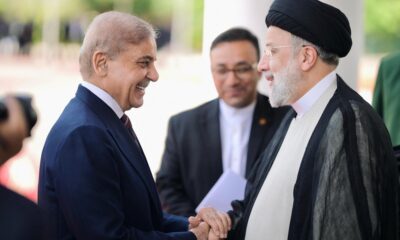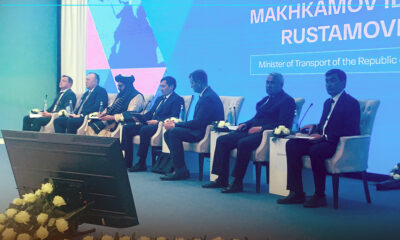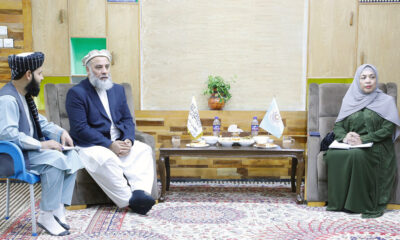Latest News
95% of people in Afghanistan do not have enough to eat: WFP

The United Nations’ World Food Programme (WFP) says 95 percent of people in Afghanistan “do not have enough to eat,” and that “hunger continues rising in Afghanistan”.
On Saturday, the WFP Asia Pacific warned on its official Twitter account that in January, “8 in 10 income-earning households experienced a significant decrease in income, with Kabul hit the hardest. Worse still, some were forced to brave the cold month with no income at all.”
Since the chaotic withdrawal of foreign troops from Afghanistan, the collapse of the former government and the take over of power by the Islamic Emirate of Afghanistan (IEA) in August last year, unemployment levels have increased throughout the country, leaving parents unable to provide food for their families.
The direct result has been a surge in malnutrition, producing a dramatic rise in pneumonia in children.
Six months after the IEA took power, no country has yet recognized their rule and all foreign assets belonging to Afghanistan have remained frozen.
The UN says that Afghanistan, which is already suffering from high poverty levels, is facing “one of the world’s worst humanitarian disasters.”
On Thursday, the WFP said that “with each passing month, new waves of people are turning to drastic measures to feed their families in Afghanistan.”
It added that about two-thirds of all people in Afghanistan – “66% – are now resorting to crisis coping strategies – up from 58% in Dec 2021, & 11% before 15 Aug.”
Latest News
Iran, Pakistan leaders raise concerns over ‘terrorist groups’ in Afghanistan

Following a two-day official visit to Pakistan, Iranian President Ebrahim Raisi and Pakistan’s Prime Minister Shehbaz Sharif issued a joint statement emphasizing the need to further expand commercial and economic cooperation and transform the common border of the two countries from a “border of peace” to “border of prosperity”.
The two leaders also strongly condemned aggressions and crimes of Israel in Gaza, and demanded an immediate and unconditional ceasefire, as well as unimpeded humanitarian access to the besieged people of Gaza.
Numerous other issues were also discussed but on the topic of Afghanistan, they jointly declared their commitment to the development of Afghanistan as a peaceful, united, independent country free from the threats of terrorism and drug trafficking.
According to the statement the two countries pointed out that the existence of terrorist organizations in Afghanistan is a serious threat to the security of the region and the world.
The two sides stressed their desire to strengthen cooperation in the field of fighting terrorism and ensuring security and creating a united front against terrorism.
They also discussed the importance of coordinating regional and international efforts to ensure security and stability in the region.
“While respecting the sovereignty and territorial integrity of Afghanistan, the two sides recognized that increasing participation of all strata of Afghans in basic decision-making will lead to the strengthening of peace and stability in this country,” the statement read.
Latest News
Over 1,000 Afghan refugees forced out of Pakistan in one day

The Ministry of Refugees and Repatriations (MoRR) says over 1,000 Afghan migrants were forcibly returned from Pakistan on Tuesday through Spin Boldak border crossing in Kandahar province, the ministry said in a statement.
The ministry stated that based on information provided by the Spin Boldak Kandahar border command, these returnees comprised 191 families, totalling 998 people.
In addition, three migrants released from Pakistani prisons were also returned, according to the statement.
The statement added that after registering the returnees, the refugees were referred to the offices of the International Organization for Migration (IOM), the World Food Program (WFP) and the United Nations High Commissioner for Refugees (UNHCR).
Each family received 10,000 afghanis – paid to them by the Islamic Emirate.
In another statement, the ministry said that 2,783 migrants living in Iran voluntarily and forcibly returned to the country during this week.
Latest News
Afghanistan’s minister of transport and aviation attends regional meeting in Uzbekistan

Hamidullah Akhundzadeh, acting Minister of Transport and Aviation, headed a delegation to Uzbekistan for a ‘Six-Party Corridor’ meeting that included representatives from Afghanistan, Russia, Belarus, Pakistan, Kazakhstan and Uzbekistan.
On the sidelines of this meeting the Afghanistan delegation discussed trade through the corridor with the other five relevant countries.
According to the ministry of transport and aviation, Akhundzadeh met with the deputy ministers of transport of Russia and Belarus.
He also discussed ways to expand transit between Afghanistan and Russia; and Afghanistan and Belarus, and provide the necessary facilities to achieve this.
The ministry added that the acting minister had a bilateral meeting with the Minister of Transport and the Special Representative of the President of Uzbekistan on Afghanistan and discussed the expansion of road transport between the two countries.
-

 Sport4 days ago
Sport4 days agoAfghanistan Champions League kicks off with grand opening ceremony
-

 Regional5 days ago
Regional5 days agoIran’s foreign minister downplays drone attack, says Tehran investigating
-

 Latest News4 days ago
Latest News4 days agoPakistan’s frontiers minister stresses ‘dignified’ return of Afghan refugees
-

 Business5 days ago
Business5 days agoAfghanistan’s economic prospects are bleak: World Bank
-

 Latest News4 days ago
Latest News4 days agoMore than 800 Afghan refugees deported from Pakistan in two days
-

 Regional2 days ago
Regional2 days agoIranian president lands in Pakistan for three-day visit to mend ties
-

 Climate Change3 days ago
Climate Change3 days agoMassive river flooding expected in China, threatening millions
-

 Latest News4 days ago
Latest News4 days agoChinese keen to invest in Panjshir-Kabul water conduit project
























